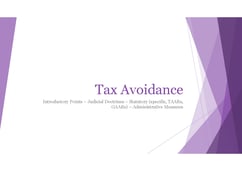Jones v Garnett [2006] BTC 24
Judgement for the case Jones v Garnett
Table Of Contents
The House confirmed that the arrangement must be bounteous in order to be a settlement.
-
H the taxpayer was an IT specialist who decided to set up a business on his own. H and W (his wife) who had office skills, bought Arctic Systems, an off-the-shelf company.
The shares were divided equally between H and W; H was the sole director and W was co secretary.
He provided the co’s technical and money-making skills as an IT consultant, while W provided her administrative skills.
W was not made a director; she has no right to dividends and, as these were decided upon by H, she received them at his discretion.
Each received a small salary with dividends in the £20,000+ range.
The company paid corporation tax.
The Rev invoked TA 1988, s660A, now ITTOIA s624 on the basis that there was a settlement, that the property comprised in the settlement consistent of the shares and so the dividend income to her was to be treated as his.
-
Both Commissioners held there was such an arrangement.
The senior commissioner said the shares were allocated with the intention of declaring dividends in the future.
The other commissioner held that there was no element of bounty when the shares were acquired; for her an intention to provide bounty (dividends) later on was not the same as the provision of the bounty itself. She pointed to the fact that the appellant was not under any obligation to provide services to the co at that time, i.e. when the shares were allocated
This shows how very narrow the divide is between the two commissioners and how easily a slightly different set of facts might give rise to different results.
The HL ultimately decided in HMRC’s favour on the question whether an arrangement was bounteous and constituted a settlement, but in the taxpayer’s favour on the application of the rule excluding outright gifts between spouses from the settlement rules.
Loutzenhiser
The settlements provisions are anti-avoidance legislation designed to prevent an individual from gaining a tax advantage by making arrangements to avoid tax either by accumulating income or by splitting his or her income with other persons who are taxed at a lower rate or are not liable to income tax at all.
-
If income from property arises under a ‘settlement’ (including an ‘arrangement’) and the ‘settlor’ has an interest in the property, then the income is treated for income tax purposes as the income of the settlor and not the income of the person whose income it actually is.
Further, the settlor is treated as having an interest in the property in a situation where income from the property may become payable to his or her spouse, unless there is an ‘outright gift’ from one spouse to another, unless the gift is wholly or substantially a right to income.
-
The courts have given “arrangement” a broad, imprecise meaning for the purposes of the settlement provisions. And so long as there is sufficient unity to the taxpayer’s actions they will be capable of being an arrangement.
While the scope of the word “arrangement” is broad, the cases have also established that before an arrangement can be within the definition of settlement an element of ‘bounty’ must be present.
Whilst the commissioners and judges hearing Jones v Garnett all agreed that an element of bounty was necessary in order to have a statutory settlement, there was considerable disagreement as to whether a bounteous arrangement existed in Mr. and Mrs. Jones's situation.
HL gave effect to the intention of the settlements provisions. “arrangement” is capable of having a wide meaning, but that is precisely the point – these are anti-avoidance rules. Although the Law Lords were not willing to disturb the established role of “bounty”, they were content to approach the issue with caution and, in Lord Hoffmann's words, take “a broad and realistic view of the matter”.
Consequently, the bounty requirement does not seem to be difficult to satisfy, so long as the arrangement at issue would have been entered into only by parties dealing otherwise than at arms' length.
For Further Study on Jones v Garnett
Need instant answers? Our AI exam tutor is here to help.
Ask questions 🙋 Get answers 📔 It's simple 👁️👄👁️
Our AI is educated by the highest scoring students across all subjects and schools. Join hundreds of your peers today.
Get StartedSimilar Cases
Related Product Samples
These product samples contain the same concepts we cover in this case.
| Tax Law | Income Tax Notes (12 pages) |

 Since 2010, Oxbridge Notes has been a trusted education marketplace, supplying high-quality materials from top achievers at universities like Oxford, Cambridge, LSE, Harvard, and Yale.
Since 2010, Oxbridge Notes has been a trusted education marketplace, supplying high-quality materials from top achievers at universities like Oxford, Cambridge, LSE, Harvard, and Yale.